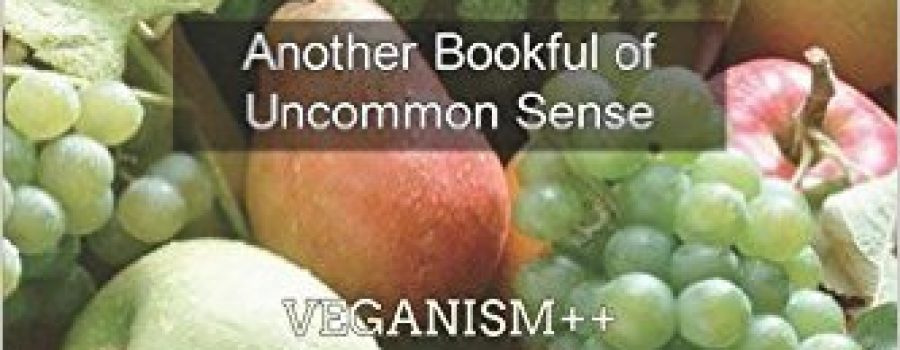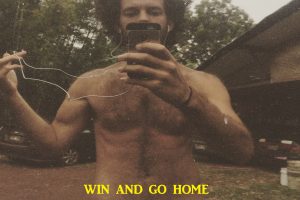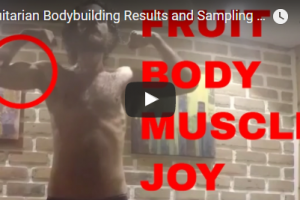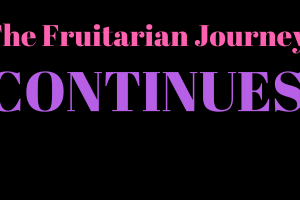A few weeks ago I had the honor of receiving a copy of Mango Wodzak’s new book: The Eden Fruitarian Guidebook. I had been wanting to read it since I finished reading Mango’s first book, Destination Eden, but I had procrastinated in doing so. One of the reasons for waiting so long was that I had found Destination Eden sooooooo full of amazing information that I simply couldn’t believe that Mango could have anything else to say about fruitarianism and the fruitarian diet. I was obviously wrong.
Introducing The Eden Fruitarian Guidebook
Mango Wodzaks’ new book starts with a quick introduction to Eden Fruitarianism. In the first pages he explains that most flavors of fruitarianism focus on health, diet and fitness, but his is, above all, a philosophy for non-violence. He adds that Eden Fruitarianism’s main focus is to recognize raw, fresh, ripe fruit as “our one true food”.
Following his fruitarian definition, Mango introduces the “Ethical Food Tower”, which views foods in terms of the amount of harm required during its production. At the top of the tower we find all nourishing fruits and at the very bottom we find animal flesh. The goal of the Eden Fruitarian is to eat as high on the ethical food tower as one possibly can.
Mango also reminds the skeptic reader that even though all food may be tainted in some way, causing harm in its production, harvesting and distribution, we still must acknowledge that of all foods, fruit is clearly the only one which is truly given by the plant, causing the least damage to the Earth’s surface and the surrounding native fauna and flora.
Mango concludes his introduction of The Eden Fruitarian Guidebook explaining that “the ultimate goal of Eden Fruitarianism, is for no intentional harm to be done, for every life form to live harmoniously and symbiotically side-by-side with every other life form on the planet”. He understand that such a reality may seem distant, but he emphasizes that in order for this to be a possible future, we must first acknowledge these ideals.
Veganism as the Foundation of Eden Fruitarianism
In the following sections of The Eden Fruitarian Guidebook, Mango Wodzak recognizes veganism as the foundation of Eden Fruitarianism. He shares how the movement is gaining momentum and how it is quickly becoming a small, but notable part of mainstream society. He also points towards the raw vegan movement and how it has gain popularity over recent years, led by people such as Douglas Graham, author of The 80/10/10 Diet.
Veganism is the foundation of Eden Fruitarianism because it requires us to empathize with other life forms. Just in case you don’t know, veganism is a way of living which seeks to exclude, as far as is possible and practicable, all forms of exploitation of, and cruelty to, animals for food, clothing or any other purpose. Mango goes on to explain all the things that humans and animals have in common in hope that, by learning to empathize with animals we will also learn to empathize with plants.
Mango goes on to use the following 67 pages to counteract every single argument against veganism. He lists a total of 75 arguments, from protein and B-12 deficiencies to the thought that veganism is extreme. He also touches on the issue with speciesism, which eventually ends up showing that all vegans are hypocrites, unless they are fruitarians.
Plant Also Have Feelings
On the following chapter of The Eden Fruitarian Guidebook, Mango Wodzak shares that when vegans are challenged with the idea that plants have feelings too, they quickly point out that plants have no obvious central nervous system or limbs to escape onslaught, and therefore rest in the idea that plants have no feelings or the right to live. Mango explains that it is convenient for vegans to dismiss plant sentience as ridiculous, just like it is convenient for non-vegans to dismiss animal rights.
In one of my favorite passages of Mango’s book he writes: “Nobody finds true pleasure from knowing that they are the cause of another’s suffering. But, if plants are capable of breathing without lungs, eating and processing their foods without a mouth or stomach, pumping their life’s fluid without a heart, hearing without ears and moving without muscles, don’t you find it naïve to jump to the conclusion that their lacking of a commonly recognized central nervous system and brain should be proof they are unable to feel and think?”.
He then goes on to explain how plants have senses similar to sight, sound, smell, taste, touch and movement, and other senses such as intuition. For all of these explanations he provides sufficient proof backed by scientific research from a wide variety of fields. On top of that, he also offers reasons to believe that plants have something similar to a central nervous system and emotions.
Eventually, Mango explains that “every life form has a reason to live that involves its own individual development” and that “nothing exists purely to be used by another, or other, life forms.” He also shares with me the belief that “all life forms possess some form of consciousness, and therefore some form of “thought”, and that this is at the very essence of every being.”
Fruitarians in Favor of our Ecosystem
Mango dedicates the next chapter to explain that those who can’t consider veganism or fruitarianism for the sake of animals and plants should at least consider them for the sake of human’s health. He goes on to talk about greenhouse gasses and global warming, fresh water pollution, the importance of biodiversity and the danger of species extinction. He expands to make important remarks about proper caring of the land and our oceans, and the alarming dangers of colony collapse disorder, a consequence of modern farming practices that could lead to the extinction of all humans.
Transitioning to a Fruitarian Diet
The second section of The Eden Fruitarian Guidebook is dedicated to educating people about the importance of fruit and fruit-based diets. The chapters in this section cover the benefits of fruit, it’s suitability for human anatomy and physiology and the importance of switching to a fruitarian diet.
Mango also cover’s every angle of the process of transitioning to a fruitarian diet. He makes emphasis on topics such as detoxification, dealing with opposition from friends, family, authorities and strangers, working with addictions and excuses and most importantly, cultivating empathy.
Manifesting Paradise
The third and fourth sections of Mango’s book take a look at the bigger picture. From the origins of mankind, to mass media dominance, conspiracies, religion, fear and ultimately, peaceful evolution, the pioneer mind, and the importance of keeping our focus on Eden and the world we wish to live in.
Mango concludes his book with a chapter on frequently asked questions. The questions presented take on topics such as the use of technology, the ownership of pets, the intricate aspects of the fruitarian diet and other random miscellaneous topics like abortion, moon landings and ultimately, enlightenment.
The Eden Fruitarian Guidebook may not be the best book in the history of mankind, but it certainly provides a beautiful composition of insight, love and invaluable knowledge that we can all appreciate. I recommend this book to vegans, non-vegans and fruitarians alike. It’s wisdom is a needed resource for every human in the world and Mango’s delivery is as clean and kind as his diet. Another masterpiece by Mango Wodzak.





